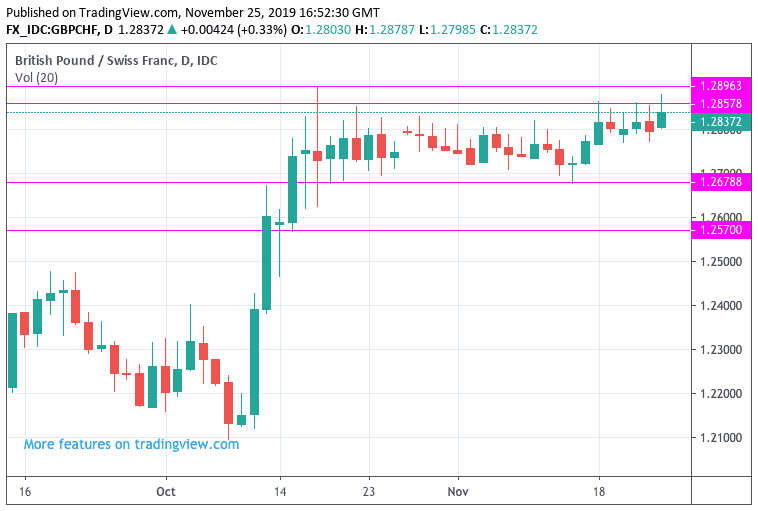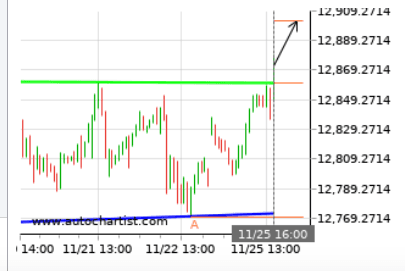Pound-Franc Week Ahead Forecast: Looking to Press Higher, SNB Comments Aid Swiss Franc

Image © Adobe Images
- Bullish signal for next two days
- GBP/CHF hitting head on range ceiling
- SNB comments seen behind rally in Franc exchange rates
The Pound-to-Franc exchange rate is quoted at 1.2844 at the time of writing, 0.37% higher than where it opened this week's account, and the setup behind the currency looks to favour further Sterling gains.
The gains in GBP/CHF come despite a day of outperformance for the Franc, which appears to be rallying against other currencies on comments from the Swiss National Bank's Chief Economist regarding the future of negative interest rates in Switzerland, more details on this below.
The GBP/CHF exchange rate has been oscillating between a rough range that is defined by a floor at 1.27 and a ceiling 1.2897 since October 15, and we would be inclined to believe this range will hold until markets get a clearer sense of the outcome of the December 12 General Election in the UK.
The exact range can be defined by other levels depending on your taste, but the point we want to press home to readers that the market has been trending sideways but is now looking more intent of moving higher again:
Recent polling has shifted the odds of a Conservative majority outcome towards 70% with the Betfair Exchange, which explains the fresh bid behind the Pound.
As such, there is the chance that Sterling-Franc can break through the top of the aforementioned range and deliver fresh multi-week bests for Franc buyers.
Researchers at Autochartist, a specialist provider of technical analysis, say the Pound is a buy against the Franc, as GBP/CHF has now broken through a resistance line:
"Possible bullish price movement forecast for the next two days towards 1.2902," say Autochartist.
The Pound might be finding buying interest on expectations for a Conservative majority, but the Franc is also doing relatively well, courtesy of comments from policy makers at the Swiss National Bank (SNB).
The SNB's Chief Economist Carlos Lenz told Swiss Sunday newspaper NZZ am Sonntag there remains additional room to cut its already negative interest rate.
But, Lenz added "they cannot fall indefinitely."
Currencies tend to fall when their issuing central bank cuts interest rates, or threatens further cuts. However, Lenz seams to be suggesting that the ability to cut interest rates is not infinite, and that there is a limit.
This hint that the SNB could be running out of road on delivering further negative interest rates is seen to be behind the bid in the Franc, which is the second-best performing G10 currency behind Sterling.
It appears that Lenz is concerned that ever-lower interest rates could ultimately start to destabilise the Swiss financial system. "What’s crucial: cash has an interest rate of 0%. If the rate on bank deposits is significantly below that, clients will withdraw their funds. But that threshold hasn’t been reached because holding cash also comes with high costs. That’s why the national bank still has room for downward manoeuvre,” said Lenz.
"The Swiss National Bank remains in ultra-dovish mode, though there is very little expectation that the SNB will cut the -0.75% policy rate again – having failed to match the recent ECB easing. Instead, the SNB will be quietly happy that EUR/CHF is not trading even lower and, seemingly, that the SNB has not had to increase FX intervention," says Francesco Pesole, FX Strategist at ING Bank.
The SNB has kept the basic Swiss deposit rate at -0.75% since 2015.
It has also been said to intervene in currency markets, if necessary, to stop the Franc's valuation from climbing.
Retail banks meanwhile argue negative rates are depressing their profitability, and are becoming increasingly loud in their criticism.
Time to move your money? Get 3-5% more currency than your bank would offer by using the services of a specialist foreign exchange specialist. A payments provider can deliver you an exchange rate closer to the real market rate than your bank would, thereby saving you substantial quantities of currency. Find out more here.
* Advertisement


